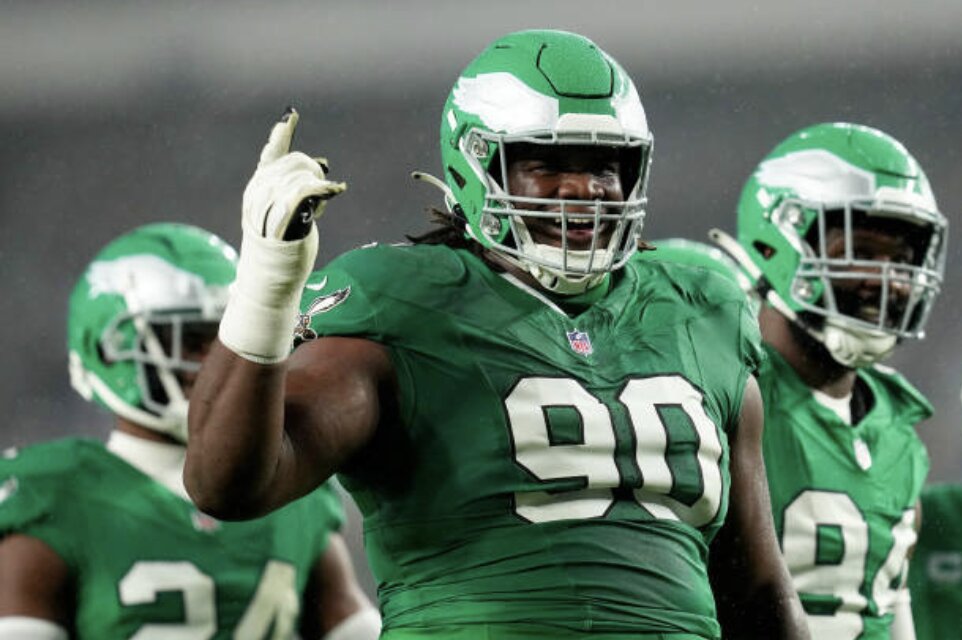Brian Westbrook: Sanders Can Go For Miles
Former running back Brian Westbrook is the Eagles’ third-leading rusher all time, behind only LeSean McCoy and Wilbert Montgomery.
But Westbrook has also caught the fourth-most passes in team history, making him arguably the most dynamic non-quarterback weapon who’s ever played for the Eagles.
In 2004, his third season, Westbrook took the torch from Duce Staley and emerged as the lead ball carrier for Andy Reid’s ground game. He totaled 1,515 offensive yards, blossoming into the dual-threat weapon most responsible for Eagles advancing to the Super Bowl after three straight conference championship losses.
Two years later, Westbrook emerged into one of the sport’s most prolific weapons, totaling more than 4,000 offensive yards in 2006 and 2007.
Reid’s blueprint never intended for Westbrook to average 20-plus touches per game, but injuries to Donovan McNabb and pedestrian receivers always forced the head coach to lean heavier on his halfback.
The potential parallels between Westbrook’s career path and what might be in store for Eagles running back Miles Sanders are easy dots to connect.

Miles Sanders is revving up for a breakout 2020.
As a rookie chosen 52nd overall last year, Sanders flashed scary similarity to Westbrook. Despite a turbulent midseason that pushed him behind Jordan Howard, Sanders surged during the latter third of the season, finishing with the NFL’s eight-most all-purpose yards.
Sanders smashed Eagles rookie records for rushing yards (818) and yards from scrimmage (1,327 yards) and also became the first Eagles rookie in 33 seasons to accrue more than 170 touches.
The Eagles believe a healthy return for wide receiver DeSean Jackson and the addition of several rookie receivers, including first-round pick Jalen Reagor, will provide the explosion badly missing from their offense last year.
But just like Westbrook logged an expanded role when injuries at quarterback and receiver propelled him up the totem pole, Sanders must be ready to shoulder a similar role if Carson Wentz were to suffer another prolonged injury of if the young receivers don’t develop quickly enough.
Said Westbrook on a recent appearance on Inside The Birds TV:
“He has to understand that the burden of carrying this team just may land on his shoulders. Of course we want Carson to be healthy, we want Carson to play 16 games plus the playoffs, but the burden of carrying this team may land on Miles Sanders’ shoulders.
“So his thought process this whole offseason has to be, ‘I’m going to get a great opportunity here. I’m going to get an opportunity to be an explosive back that’s going to touch the ball an awful lot. I’m going to be able to touch it in a variety of different ways. I’ve seen a bunch of his workouts [on social media]. He looks like he’s prepared.”
Sanders has promoted his offseason workouts on his social media accounts. In a recent video posted on Instagram, Sanders appeared to scream “MVP year.” Later, on his Twitter account, Sanders didn’t backpedal.
My confidence is through the roof and I know what I can do for this team, I ain’t apologizing for saying that, just don’t be surprised when it happen!
— Miles Sanders (@BoobieMilesXXIV) May 20, 2020
Westbrook believes Sanders’ statements reflect more than just typical offseason lip service.
“To me as I see it, he now understands, ‘The burden is going to be on my shoulders, I have to be willing to carry that,’” Westbrook said. “If you have that thought process — the same way with me — you work a little harder. You become a little tougher, mentally. You create that shell on you. And by doing that you become a better player. I think that year will be another breakout year for Miles.”
Westbrook’s surge into a workhorse, multidimensional weapon who amassed nearly 700 touches between 2006-2007 wasn’t just the byproduct of McNabb’s 2006 knee injury and receiver turmoil in 2017.
Westbrook earned his label as three-down back by mastering the art of pass protection and blitz pickup, a must trait for any primary halfback in Reid’s West Coast offense.
Like most rookies, Sanders struggled early when asked to stay home and block, but Westbrook saw his improvement toward the end of the season. The other tricky areas for rookie running backs – following blocks, charting inside running lanes, catching out the backfield – also matured, some areas more impressively than others.
Sanders didn’t catch the ball much at Penn State, where he sat for three years behind superstar and No. 2 overall pick by the Giants, Saquon Barkley. But by Week 3, Sanders had unveiled an unseen ability to stretch the field vertically at the seams, hauling in passes of 33 and 40 yards from Wentz, both catches executed over-the-shoulder style.
In a Week 6 loss to the Vikings, Sanders again stamped his presence in the vertical game as Jackson remained sidelined. He caught a 32-yard touchdown pass in the third quarter, followed by a 45-yard haul in the third, leading the team with 86 receiving yards.
Sanders receptions mainly came on routes where his initial alignment was in the backfield. Westbrook, in his heyday, would flex into the slot to draw slower linebackers or safeties into coverage.
At Villanova, he learned route concepts and reading leverages to help separate against man coverage or where to sit down in zones. That’s a part of Sanders’ game yet to be seen, but the potential is there.
Added Westbrook:
“His skill-set has to continue to improve as far as if they want to displace him out of the backfield and run routes with him. That’s going to be what the offseason is all about. Anytime you get an offensive weapon like Miles who has explosion and speed against a less-talented athlete — a linebacker or safety — you have to be willing to take advantage of that. That’s something I think Miles has to work on, and I think Carson [Wentz] has to work on [throwing those passes] as well.”
Sanders’ best chance for a monster breakout will come if Jackson, one of the NFL’s preeminent deep threats, can stay healthy. Jackson missed almost all of last season with a groin injury that eventually required his surgery after catching touchdowns of 51 and 53 yards in the opener.
Defenses are forced to position their safeties deep against the Eagles when Jackson is lined up on the outside. Deeper safeties means fewer defenders in the box to guard against the run.
“I’m excited about this offense,” Westbrook said. “If they can find a consistent downfield stretch (receiver), a person that can stretch the defense, you just have to imagine what you’re running against.
“You have a quarterback that can get the ball down the field. You have tight ends that can stretch the field, outside guys that can make some plays. If I’m Miles Sanders, this is the season for me. This is the season that I’m going to face the lightest boxes that I’ve probably have ever faced. Now it’s up to Doug [Pederson] and the offensive brain trust to make sure he gets the ball in an optimal position.”
Geoff Mosher (@geoffmoshernfl) is a longtime Philadelphia Eagles and NFL reporter and co-host of Inside the Birds.
Catch the latest “Inside the Birds” podcast here:
Catch the full “ITB TV” interview with Brian Westbrook here:






Comments are closed here.